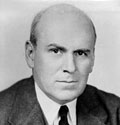| In
C. Wright Mills’s 1956 book, “The Power
Elite,” John J. McCloy was characterized as the
epitome of the behind-the-scenes establishment that
ran America. His career in government began in 1917,
when, as a 22-year-old lawyer in the Justice Department,
he was assigned the task of investigating the 1917 Black
Tom munitions explosion in Hoboken, N.J. Through brilliant
investigative work, he identified it as German state-sponsored
terrorism. He then moved back and forth between the
private sector and government, serving as assistant
secretary of war, president of the World Bank, high
commissioner for Germany, and finally, under President
Kennedy, as disarmament adviser. President Lyndon Johnson
chose him to represent the private sector on the Warren
Commission.
I met McCloy at 2:35 PM in his office on the 46th Floor
of the Chase Manhattan Bank, of which he had been chairman.
He was now, in his early seventies, a senior partner
at the corporate law firm of Milbank Tweed Hadley &
McCloy., As he rose slightly to greet me, his body seemed
much too small for his massive head. He asked his secretary,
a Miss Wilson, to hold all his calls.
He began the interview by telling me that he viewed
his appointment to the Warren Commission as a continuation
of his government service. He joked that since he was
unemployed at the time, unlike the four Congressional
members of the Commission, he had time to attend all
of the hearings in which witnesses had testified. He
leisurely told me how his work on the Black Tom had
led him to believe that an investigation should have
its own investigators. So he convinced Chief Justice
Warren to set aside the FBI report and organize an independent
investigation staffed by young lawyers.
I asked him why he opposed using FBI agents for the
investigation. He replied coolly, “J. Edgar Hoover
likes to close doors. I told Warren we had to re-open
them.”
Had the commission’s investigation faced limits
in what it could report?, I asked.
He answered by describing Thornton Wilder’s novel
“The Bridge Of San Luis Rey,” in which an
investigation uncovered a series of sexual liaisons.
He compared the book to the investigation, saying, “We
had uncovered a lot of minor scandals, but they were
not relevant to our investigation. We decided not to
publish them in the report.”
When I pressed him on what these scandals involved,
he replied, “It was as if someone picked up a
rock and the light caused all sorts of bugs to run for
cover.” He said the Secret Service needed to obscure
indiscretions of its agents the night before the assassination,
the FBI had to expunge embarrassing incidents from its
reports, and the CIA had to hide its domestic activities.
He added that even Attorney General Robert Kennedy,
the president’s brother, had put his own man,
Howard Willens, on the staff, to deal with “inappropriate
revelations.”
I had already interviewed Willens at his office at the
Justice Department, and he had told me that the attorney
general had dispatched him to the commission to make
sure it had assistance from the Justice Department,
but he said nothing about suppressing any material.
So I asked McCloy about what Willens had done.
“He locked away material in his desk,” he
replied. According to McCloy, Willens did not believe
the staff had any need to see it. He said it concerned
a “national security issue” he was not free
to discuss.
I asked whether the commission had fully explored Oswald’s
foreign connections.
He said that he himself believed there was persuasive
evidence that Oswald had been trained in espionage and
that Oswald might have been “a sleeper agent who
went haywire.” He said Warren did not buy his
theory, and he lost the argument because “Warren
was, you need to understand, stubborn as a mule.”
|


